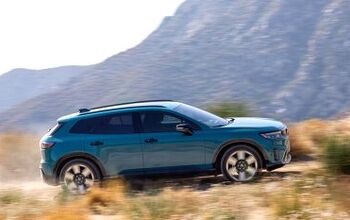Cell Phones And Cars: Stating the Obvious to the Oblivious"
Sometimes” obvious” is a vague concept for people and nowhere is that more obvious than behind the wheel of a car. The basic rules of engagement on the road are subject to interpretation by many drivers whose personal universe exists within a tight gravitational pull of their physical location.
I’ve compiled a short list of egregious cell phone sins against the rules of the road committed by stupid or self-absorbed drivers, or a combination platter of both.
This is not exactly virgin territory when the discussion of bad drivers raises its ugly head, but the topic never gets stale as long as these idiots still prop themselves behind a steering wheel. I simply want to add my voice to the wilderness on this issue even though I am likely preaching to the choir in this particular forum where insightful thoughts and words are not mortal enemies (Insert gratuitous pandering to an audience here).
The aforementioned wilderness dwellers would likely be the throngs of dedicated airheads who don’t wrap themselves in provocative thought and are unlikely to care about anything outside of the realm of Paris Hilton’s view of the world. Unfortunately many of them still drive cars, largely because of a generous approach to license acquisition in most of North America. But even if I am largely baying at the moon, I still want to vent my spleen on Driver 101 – the new issue.
The most obvious problem is driver distraction and this manifests itself in many forms including the cell phone. A popular cliché emerged a few years ago called “ multi-tasking”. This is a myth-based concept that holds the belief that people can do more than one thing at a time, and they can do it efficiently because we have a couple more intellectual DNA strands than chimps.
I don’t even remotely buy into this BS when it comes to multi-tasking. You are more likely to find Bigfoot and the Loch Ness monster living in sin than a genuine multi-tasker. We do one thing at a time well and everything else is a distraction. Nowhere is this more evident than behind the wheel of a car with a cell phone glued to one ear.
Not only are the synapses hogtied but so is one pre-occupied cell phone hand that should be on the steering wheel. All we have is another half-wit with half a grip on a steering wheel. Look in the recipe book under “d” for disaster for this one and it happens at an insane rate every day.
The worst part of this fiasco is that hands-free cell phone use is just as dangerous, according to NHTSA data and that should not be a surprise to anyone. We are not multi-taskers. Most of us barely do one thing well- just ask the Detroit Lions.
42 countries currently restrict or prohibit cell phone use while driving and they are probably 42 countries with a much smaller herd of ambulance –chasers among their citizenry than North America. Cell phone bans or restrictions have begun to take hold in local and state legislation, but the process has been slow.
Right now 6 states have hand-held cell phone bans with 5 states as a primary enforcement law and Washington State as a lone holdout. Primary enforcement means that you can be ticketed for the offense of stupid phone use without any other reason to stop you. You need to have another reason for stupidity in the state of Washington to get stopped and ticketed where the cell phone citation is only a side order.
No state has a blanket ban on cell phone uses and thus they allow for the hands-free cell user even if the driver has drifted into a disembodied conversation and away from the driving task at hand. Now just think about this one. A car wreck may be centered around somebody who got worked up over shoe color or the merits of WWE in a cell phone conversation. Sadly, people have died for less compelling reasons, but most would want to die for more noble causes. Almost all cell phone conversations eliminate that possibility.
But things can get worse. Now there is a real possibility to die at the hands of a horrible speller with brutal grammar. Texting has replaced conversations on cell phones even though Big Al Graham Bell went to a lot of trouble to design the phone for an audible purpose. Granted, it’s not like people are really thinking while they are texting, but they are not really thinking about driving either, and therein lies the problem.
Texters have to compose and read their butchered messages instead of reading the road in front of them and this poses a small safety problem at 70 mph on a busy freeway. Obvious, but not to every driver on the road who lives in that highly compressed self-centered universe where they may get deader long before they get smarter behind the wheel.
The final blow against cell phones is the ability to watch downloaded movies or programs or play video games on them while driving. This scenario is almost too stupid to describe but can you imagine a crash caused by a distracted video gamer/driver that was playing a driving game while driving? It’s probably already happened.
I guess the final answer is that sometimes you need to impose blanket legislation against blanket stupidity and a ban on cell phone use of any sort while behind the wheel is a no-brainer for the no-brainers who practice this behavior. Six states with half-assed legislation is not nearly enough.
For more of Jim Sutherland’s work check out http://www.mystarcollectorcar.com/
More by Jim Sutherland
Latest Car Reviews
Read moreLatest Product Reviews
Read moreRecent Comments
- TheEndlessEnigma Of course they should unionize. US based automotive production component production and auto assembly plants with unionized memberships produce the highest quality products in the automotive sector. Just look at the high quality products produced by GM, Ford and Chrysler!
- Redapple2 Got cha. No big.
- Theflyersfan The wheel and tire combo is tragic and the "M Stripe" has to go, but overall, this one is a keeper. Provided the mileage isn't 300,000 and the service records don't read like a horror novel, this could be one of the last (almost) unmodified E34s out there that isn't rotting in a barn. I can see this ad being taken down quickly due to someone taking the chance. Recently had some good finds here. Which means Monday, we'll see a 1999 Honda Civic with falling off body mods from Pep Boys, a rusted fart can, Honda Rot with bad paint, 400,000 miles, and a biohazard interior, all for the unrealistic price of $10,000.
- Theflyersfan Expect a press report about an expansion of VW's Mexican plant any day now. I'm all for worker's rights to get the best (and fair) wages and benefits possible, but didn't VW, and for that matter many of the Asian and European carmaker plants in the south, already have as good of, if not better wages already? This can drive a wedge in those plants and this might be a case of be careful what you wish for.
- Jkross22 When I think about products that I buy that are of the highest quality or are of great value, I have no idea if they are made as a whole or in parts by unionized employees. As a customer, that's really all I care about. When I think about services I receive from unionized and non-unionized employees, it varies from C- to F levels of service. Will unionizing make the cars better or worse?

































Comments
Join the conversation
I would love to have one of those cell-phone signal eradicator devices hooked up in my car, so that whenever I drive, other drivers on the same road would be forced to terminate their conversations....